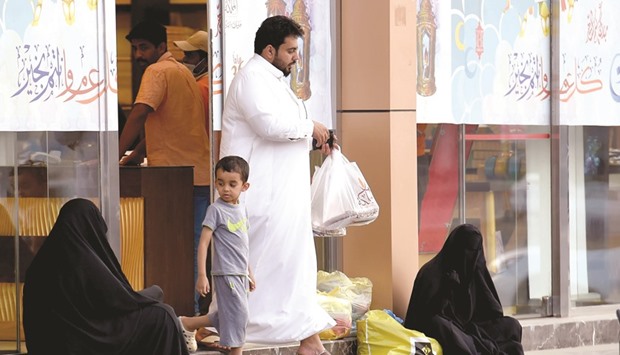Clad in black and with a baby in her lap, a woman sits on the ground shaking a cardboard box outside the door of a mosque.
She says she is from Jazan, a southern region of Saudi Arabia bordering Yemen, and begs every day outside the mosque in a Riyadh neighbourhood of migrant workers.
Many of the South Asian men attending the mosque are low-paid labourers but they still spare a riyal for her.
The box fills quickly as they drop the equivalent of 27 US cents after their prayers.
Charity is one of the main principles of Ramadan.
Each Ramadan, which began this year on June 6, many more beggars take to the streets of Saudi Arabia. But this year a leading charity is urging Saudis to channel their generosity elsewhere.
Alwaleed Philanthropies, the charity arm of billionaire businessman Prince Alwaleed bin Talal, says begging is linked to “street gangs” and substance abuse.
“Cases of begging rise by 50% in the month of Ramadan,” the organisation said in a statement announcing its campaign, warning that giving money “only serves to perpetuate the problem”.
It said the “reality of street-beggars” involved practices including “faking disabilities” and taking advantage of children, and that more than 700mn Saudi riyals ($187mn) was made in the kingdom every year from begging.
The campaign provides a website directing people to “the right charities”.
In 2014 Saudi authorities arrested more than 8,000 people for begging - 70% of them foreigners.
The United Nations children’s fund (Unicef) has said that many poor families who enter Saudi Arabia on a pilgrimage visa stay on illegally and become beggars, or leave children behind to beg and send money home.
The beggars are reluctant to talk and careful to avoid local authorities. A few kilometres from the Grand Mosque in Makkah, AFP spoke to one beggar sitting outside a mini market. She gave her name as Um Mohamed and said she came from Chad seven years ago on a pilgrimage. She never left.
“Good people like to give to the poor and needy. We are poor,” said Um Mohamed. “We take what we need to survive and send the rest to families in Chad.”
She says she receives 30-60 Saudi riyals on a normal day.
In a good month her earnings can rise to 5,000 Saudi riyals ($1,300), more during pilgrimage season.
Riyadh police arrested 90 beggars including 34 children during the first four days of Ramadan, the Arab News reported.

Women sitting and begging outside a supermarket on a main street in Riyadh.
